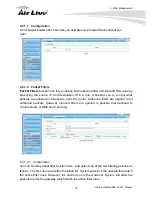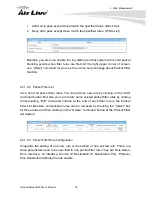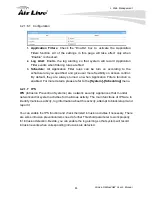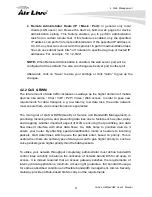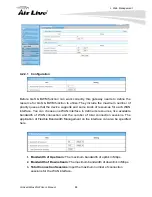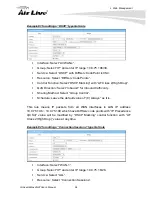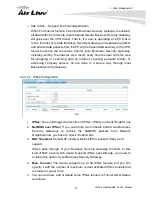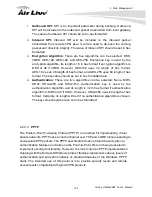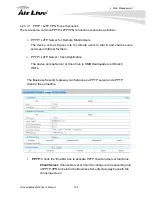
4.
Web Management
AirLive AirMax4GW User’s Manual
89
4.2.2.2 Rule-base QoS
This gateway provides lots of flexible rules for you to set QoS policies. Basically, you
need to know three parts of information before you create your own policies. First,
“who” needs to be managed? Second, “what” kind of service needs to be managed?
The last part is “how” you prioritize. Once you get this information, you can continue to
learn more details in this section.
Flexible QoS Rule Definition
•
Multiple Group Categories
➢
Specify the group category in a QoS rule for the target objects
that rule to be applied on.
➢
Group Category can bases on VLAN ID, MAC Address, IP
Address, Host Name or Packet Length. Category depends on
model.
•
Differentiated Services
➢
Specify the service type in a QoS rule for the target packets that
rule to be applied on.
➢
Differentiated services can be base on 802.1p, DSCP, TOS, VLAN
ID, User-defined Services and Well-known Services.
➢
Well-known services include FTP(21), SSH(TCP:22), Telnet(23),
SMTP(25), DNS(53), TFTP(UDP:69), HTTP(TCP:80),
POP3(110), Auth(113), SFTP(TCP:115),
SNMP&Traps(UDP:161-162), LDAP(TCP:389),
HTTPS(TCP:443), SMTPs(TCP:465), ISAKMP(500),
RTSP(TCP:554), POP3s(TCP:995), NetMeeting(1720),
L2TP(UDP:1701) and PPTP(TCP:1723).
•
Available Control Functions
➢
There are 4 resources can be applied in a QoS rule: bandwidth,
connection sessions, priority queues and DiffServ Code Point
(DSCP). Control function that acts on target objects for specific
services of packet flow is based on these resources.
➢
For bandwidth resource, control functions include guaranteeing
bandwidth and limiting bandwidth. For priority queue resource,
control function is setting priority. For DSCP resource, control
function is DSCP marking. The last resource is Connection
Sessions; the related control function is limiting connection
sessions.

